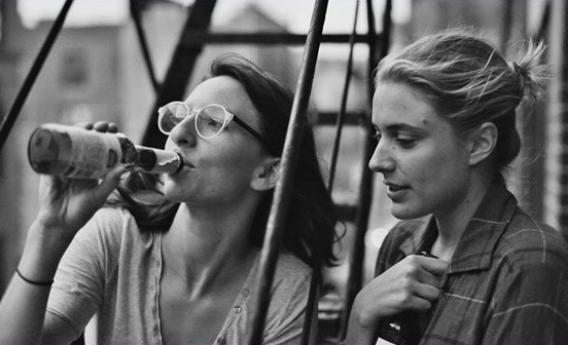Noah Baumbach’s Frances Ha, a black-and-white, French New Wave–influenced coming-of-age-in-New-York tale, has the earnest, wonky charm of a homemade valentine. The addressee is the 29-year-old actress Greta Gerwig, who plays the title character, co-wrote the script with Baumbach, and is also the director’s girlfriend—they became a couple after working together on Baumbach’s 2010 film Greenberg. If you’ve been waiting for an excuse to sit and watch Greta Gerwig just sort of behave for an hour and a half, your Sunday matinee plans are set. That’s not to say that Frances Ha dispenses completely with structure, plot and theme—it’s just that Baumbach treats those elements with more insouciance than is usual in his films, which have tended of late to be hyper-verbal, slightly sadistic drawing-room comedies (Margot at the Wedding, Greenberg).
Frances (whose last name isn’t really “Ha”—the title isn’t explained until the sprightly final shot) is a 27-year-old aspiring dancer who shares a Brooklyn apartment with her best friend from college, Sophie (Mickey Sumner). We open on a montage of a perfect day in Frances and Sophie’s harmonic roommate-hood: They meet up after work, fake-fight in the park, drink too much with friends, then go home to snuggle in Sophie’s bed and text guys as Sophie tells Frances “the story of us” (an inspirational tale about the two friends’ imminent world takeover).
But Sophie abruptly breaks the news she’s moving to a different apartment share, one that Frances, a barely employed apprentice at a dance company, could never afford. Left on her own, the childlike, disorganized Frances enters a period that’s bumpy and chaotic even by her standards. She briefly takes a room in the apartment of two slightly younger dudes (Michael Zegen and Girls’ Adam Driver) whose perfectly curated digs and carefree demeanor, she soon learns, are at least in part parentally subsidized. When that falls apart, she visits her own parents in Sacramento, Calif. (they’re played by Gerwig’s real-life parents, seen mainly in a Christmas-vacation montage that has to be the happiest tableau of family life ever seen in a Baumbach film). But Frances’ “real life”—the lonely, expensive, confusing one that she’s created for herself without meaning to—waits for her back in New York. As her friends begin to pair off and have babies and build careers, she continues to drink too much at parties, confide inappropriately in strangers, and drift from couch to couch.
Frances Ha feels like a collaboration between two people in love, and not always in the best way. There are too many scenes in a row that make the same point—Frances is a creative but lovable flake who’s her own worst enemy—and too many montages that could stand alone as music videos titled “Greta Gerwig Is Fun to Watch Do Stuff.” That said, the gangling, pratfall-prone Gerwig is fun to watch do stuff, and at least one of those musical moments—Frances tears down a crowded city street in a rare euphoric mood, occasionally doing a grand jeté just for the hell of it, as David Bowie’s “Modern Love” plays on the soundtrack—is the movie’s lyrical high point: Woody Allen by way of Truffaut.
By contrast, a long dinner-party scene in which Frances humiliates herself in front of her marginally more together cohort seemed surprisingly un-sharp for the work of a director who usually knows his way around passive-aggressive New York dinner parties. In fact, the movie’s two most memorable interludes take place outside New York—one in Paris, where Frances spends a gloomy, ill-planned weekend she can’t remotely afford, and one on the campus of Vassar College (Frances’ alma mater, as well as Baumbach’s and, full disclosure, mine). Staring down the barrel of a jobless summer, Frances signs up to work as an RA at a summer dance camp, where she’ll run by chance into her former room- and soul-mate, Sophie—now engaged and living in Tokyo, but still getting drunk and embarrassing herself at parties. The night the two friends spend together in the movie’s touching penultimate sequence is as close as this shaggy, unfocused movie comes to straightforward drama. Mickey Sumner—who only appears in a few scenes at the beginning and end—makes the conflicted, angry Sophie into a vibrant character, a drop-dead bitchy wit who we, like Frances, wish we could spend more time with.
In its best moments, Frances Ha feels like it was something of a lark for Baumbach to make (if a director who routinely asks for 55 takes of a shot can ever be said to go on “larks”). I hope this is the case, because he’s a director whose work could use an infusion of spontaneity and joy. Baumbach has been making movies about floundering young adults since he himself was one, beginning with the fine post-collegiate comedy Kicking and Screaming (1995). I was a with-reservations fan of 2010’s Greenberg—the portrait of a man in his mid-40s still struggling with the basic fact of adulthood—but it felt like the work of an artist who was also, to some degree, stuck. Given how much Baumbach seems to identify with his protagonist and leading lady here (as Frances says of Sophie to anyone who’ll listen, “we’re sort of the same person”), maybe Baumbach will take a cue from Frances and start to figure out how to enjoy being grown up.
